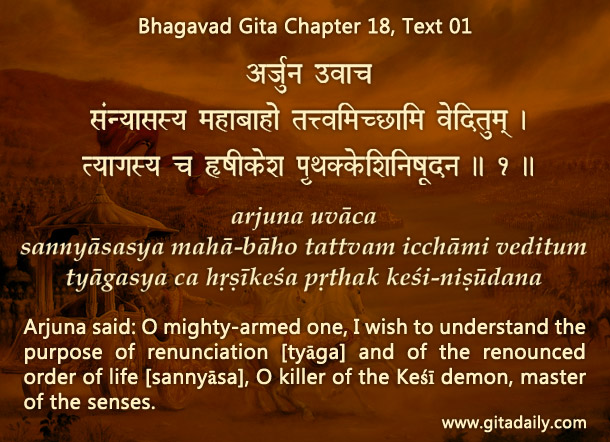Out of the Bhagavad gita seventeen chapters, where Krishna is the main speaker, nine begin with a question: 2.7, 3.1-2, 5.1, 8.1-2, 11.1-4, 12.1, 13.1, 17.1 and 18.1. Seven chapters have questions inside their flow: 2.54, 3.36, 4.4, 6.33-34 & 6.37-39, 10.17-18, 11.31, 14.21. Thus, the Gita features a total of seventeen questions. Some questions contain several sub-questions: 8.1-2 asks about seven concepts, and 13.1 asks about six concepts. The Gita’s seventeen questions at a glance
While several of these questions are complex, here are they as a simplified paraphrase:
2.7: What is dharma?
2.54: What are the characteristics of the self-realized
3.1-2: What exactly do you want me to do: fight or renounce?
3.36: What makes us act against our best interests?
4.4: How could you have instructed the sun-god when you are younger than him?
5.1: Which is better: action or renunciation?
6.33-34: Is a process that requires controlling the mind and keeping it equipoised practical?
6.37-39: What happens to those yogis who die before they attain spiritual perfection?
8.1-2: What are ‘brahma’, ‘adhyatma’, ‘karma’, ‘adhibhuta’, ‘adhidaiva’, ‘adhiyajna’, and ‘prayana-kala’?
10.17-18: How can I remember you in this world?
11.1-4: Can you please show your universal form?
11.31: Who are you? (Addressed to the ghastly aspect of the universal form)
12.1: Which is better: being devoted to you as a person or worshiping the impersonal absolute?
13.1: What are ‘prakriti’, ‘purusha’, ‘kshetra’, ‘kshetra-jna’, ‘jnana’ & ‘jneya’?
14.21: How can one transcend the modes? What are the characteristics of those who have transcended the modes?
17.1: What is the fate of those who have faith but don’t follow scripture?
18.1: What is the purpose of renunciation and of the renounced order?
One-sentence summary:
The many questions raised in the Gita reveal the book to be an open and wide-ranging discussion.
Think it over:
- Which chapters of the Gita begin with a question?
- How many questions does the Gita contain?
- Which of the Gita’s questions resonates the most with you? Why?
***
18.01: Arjuna said: O mighty-armed one, I wish to understand the purpose of renunciation [tyaga] and of the renounced order of life [sannyasa], O killer of the Keshī demon, master of the senses.
To know more about this verse, please click on the image


Leave A Comment